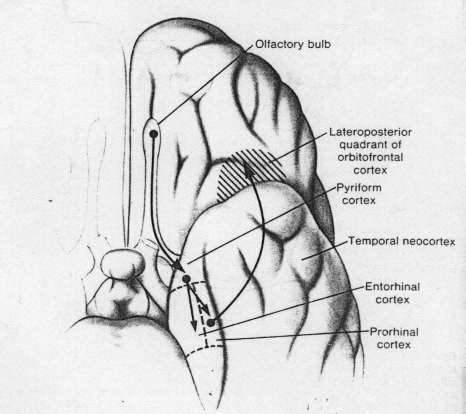 Hope that helps,
Eric
Hope that helps,
Eric
| MadSci Network: Neuroscience |
Dear Morgan, The olfactory system is perhaps one of the least understood among sensory systems. One striking characteristic of the olfactory system is that it is much more developped in inferior animals. If you look at olfactory bulbs (where the olfactory information is first processed) in the rat brain, you will find that they are quite large with respect to the whole rat brain. On the other hand, olfactory bulbs in human are relatively small. Nonetheless, early views of the limbic system (collection of several brain structures that are believed to be involved in emotions) have given an important role of the olfactory system as a major sensory input to the limbic system. Moreover, studies strongly suggest that many regions of the limbic system are also involved in memory processes. To my opinion, this makes sense because we tend to retain events that have emotional content rather than those which have not. Although some authors have shown that specific limbic structures are involved in emotions but not in memory processes as it was previously suggested (see Squire LR. Zola-Morgan S., Science. 253, pp1380-6, 1991), it remains that the olfactory system has neuronal projections from olfactory bulbs to regions identified as very important in memory (i.e. entorhinal cortex ; see figure below). To answer your question, I would say that YES, I believed that odors can influence our feelings. To illustrate my position, I will tell you an example. Imagine a child who, each sunday, goes to visit his grandmother who makes very good soup which makes the whole kitchen smell very good. Suppose that the child has now became an adult and did not visit his grandmother for many years. The person then goes in a house where a cook has made a similar soup which also produces a similar smell. At this moment, the person may experience a strange feeling, reminiscent of his interior state when he/she was a child visiting his/her grandmother. Although this remains speculative, we can postulate that the olfactory information has been preserved in brain regions together with events (and emotional states) experienced at this time and that, even longtime after, these emotions can be triggered by the same (or very similar) olfactory input. This example can be compared to the feeling we get when we hear a song that we were listening to when we were younger.Hope that helps, Eric
Try the links in the MadSci Library for more information on Neuroscience.